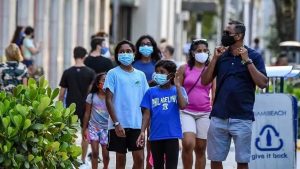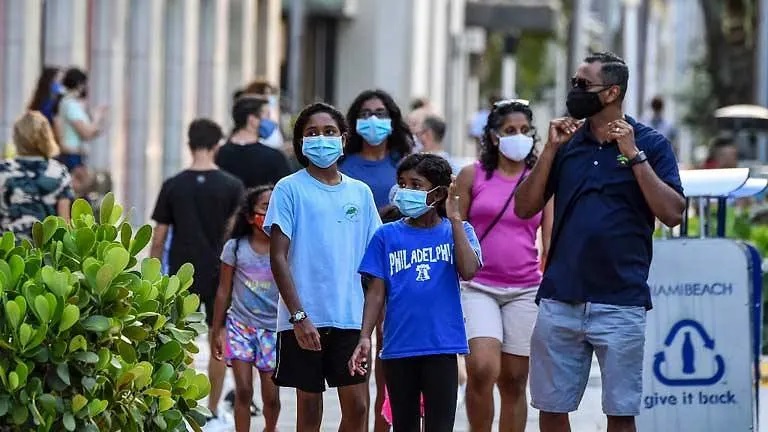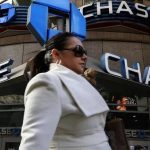
A family wearing face masks walks at a shopping centre in Miami Beach, Florida.
WASHINGTON, DC: After days of record spikes in new COVID-19 cases and hospitals warning they could run out of beds, President Donald Trump’s White House on Thursday (Jul 2) sought to convey that all was well in the battle against the coronavirus and efforts to get the US economy moving again.
Florida reported more than 10,000 new coronavirus cases on Thursday, the biggest one-day increase in the state since the pandemic started, according to a Reuters tally.
The number of cases nationwide shot up by nearly 50,000 on Wednesday, the fourth record rise in infections in the last seven days, following moves in many states to allow businesses to lift strict shutdowns aimed at containing the pandemic.
The US Centers for Disease Control and Prevention (CDC) on Thursday reported 2,679,230 cases of new coronavirus, an increase of 54,357 cases from its previous count, and said that the number of deaths had risen by 725 to 128,024.
On Thursday, Trump celebrated a report showing the economy created jobs at a record clip in June as more restaurants, bars and retail businesses resumed operations.
“Today’s announcement proves that our economy is roaring back,” Trump told reporters at the White House, while touting his administration’s efforts to beat back the virus as “a historic thing”.
The data showing a gain of 4.8 million jobs does not reflect that governors of states hit hardest by the new infections have halted or reversed moves to reopen in recent days, however.
The latest batch of high-frequency data assembled by Federal Reserve officials, economists, cellphone tracking companies, and employee time management firms suggests economic activity stalled in recent days.
“More than ever, we’re concerned about the worsening health situation and its impact on the burgeoning recovery. Rebounding mobility and poor use of protective equipment will make for a dangerous summer cocktail,” Oxford Economics analyst Gregory Daco wrote.
“ACT. LEAD. OR GET OUT OF THE WAY”
Employment remains 14.7 million jobs below pre-pandemic levels.
A strong economy is an important plank of Trump’s campaign for re-election in November. Joe Biden, his expected Democratic opponent, slammed Trump’s comments on Thursday.
“Quit claiming victory with almost 15 million Americans still out of work because of the crisis. Quit ignoring the reality of this pandemic and the horrifying loss of American life,” Biden said in a speech. “Act. Lead. Or get out of the way so others can, Mr President.”
Treasury Secretary Steven Mnuchin said it was appropriate that some states are “pausing certain things” due to the rise in COVID-19 cases.
Asked if the White House regretted encouraging states to reopen quickly, and if the move had backfired, Mnuchin said, “Absolutely not … There is a safe way to reopen the economy and we are going to do that carefully.”
Several states have reported record increases in new cases in the past week, including Arizona, Alaska, Alabama, California, Florida, Georgia, Oregon, Tennessee and Texas.
Parts of Texas and Arizona are running out of available intensive care hospital beds, officials have said.
California Governor Gavin Newsom, a Democrat, on Wednesday closed bars, banned indoor dining and imposed other restrictions in 19 counties, including Los Angeles, affecting over 70 per cent of the state.
California, the most populous US state, was the first to impose sweeping “stay-at-home” restrictions in March.
US Vice President Mike Pence, who was due to visit Florida on Thursday, said he and Trump supported governors who are pausing reopenings. But Pence said he saw no need for a national mandate for people to wear masks, which public health officials see as the easiest way to significantly decrease virus transmission.
Conservatives have generally been less willing to wear masks or follow other restrictions imposed by local authorities to stop the spread of the virus as the issue has become increasingly politicised.
Many states have gone ahead with their own orders, however. On Thursday, Kansas became the latest state to mandate wearing masks in public spaces, and where people are unable to maintain the recommended social distance of 2m.
A Reuters/Ipsos poll found Americans are increasingly worried about the spread of the coronavirus.



